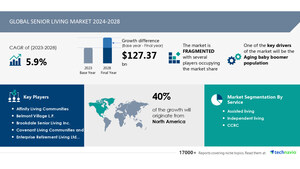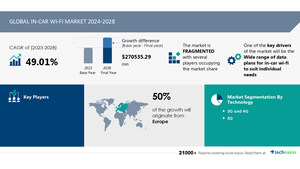NEW YORK, Nov. 11, 2024 /PRNewswire/ -- Report with the AI impact on market trends - The global vending machine market size is estimated to grow by USD 17.73 billion from 2024-2028, according to Technavio. The market is estimated to grow at a CAGR of 19.74% during the forecast period. Growing demand for cashless vending machines is driving market growth, with a trend towards tie-ups between retailers and manufacturers. However, high initial investments and maintenance costs for vending machines poses a challenge.Key market players include Azkoyen SA, Bianchi Industry Spa, BULK VENDING SYSTEMS Ltd, Compass Group Plc, Continental Vending Inc., Crane Payment Innovations Inc., Ellab AS, Federal Machine, Furukawa Electric Co. Ltd., Future Techniks India Pvt. Ltd., Glory Ltd., Intel Corp., Orasesta Spa, Royal Vendors Inc., Sanden Corp., Seaga Manufacturing Inc., Sielaff GmbH and Co. KG, The Coca Cola Co., Westomatic Vending Services Ltd., and Worldline SA.
AI-Powered Market Evolution Insights. Our comprehensive market report ready with the latest trends, growth opportunities, and strategic analysis- View Free Sample Report PDF
Forecast period |
2024-2028 |
Base Year |
2023 |
Historic Data |
2018 - 2022 |
Segment Covered |
Product (Low end vending machines and Intelligent vending machines), Distribution Channel (Offline and Online), and Geography (North America, Europe, APAC, South America, and Middle East and Africa) |
Region Covered |
North America, Europe, APAC, South America, and Middle East and Africa |
Key companies profiled |
Azkoyen SA, Bianchi Industry Spa, BULK VENDING SYSTEMS Ltd, Compass Group Plc, Continental Vending Inc., Crane Payment Innovations Inc., Ellab AS, Federal Machine, Furukawa Electric Co. Ltd., Future Techniks India Pvt. Ltd., Glory Ltd., Intel Corp., Orasesta Spa, Royal Vendors Inc., Sanden Corp., Seaga Manufacturing Inc., Sielaff GmbH and Co. KG, The Coca Cola Co., Westomatic Vending Services Ltd., and Worldline SA |
Vending machines have become a staple in business environments, offering convenience for consumers on-the-go. The market trends include the sale of on-the-go snacks and beverages, with a focus on nutritious food and healthy living. Upscale restaurants, crowded pubs, and public spaces are now incorporating vending machines, expanding beyond traditional offerings like cigarettes, lottery tickets, and candy. Food and beverage vending machines are popular in schools, malls, railway stations, airports, and commercial places. Beverages, including zero-sugar and low-calorie options, dominate the market. Coffee, energy drinks, and water are top sellers, with cashless payment methods like credit cards and touch-screen controls becoming increasingly common. Tobacco products, lottery tickets, and plastic bottles are also popular items. Food vending machines cater to workplaces, institutions, and high-traffic areas like hospitals, hotels, and offices. Smart machines with touchscreens, digital displays, and even scent and gesture-based interaction are becoming the norm. Maintenance and servicing are crucial for preventing failures and product stock-outs. Retailers collect and analyze data to target marketing efforts and optimize retail channels, including online and offline sales. Unique products and automated processes cater to fast-paced cities and urbanization. Overall, vending machines offer convenience and flexibility, adapting to changing consumer buying habits and business needs.
Several industries, including cosmetics, personal care, consumer goods, and retail, are transitioning from traditional vending machines to smart vending machines to boost their profits. Intelligent vending machines, adopted by major global retailers, are a significant market trend. These advanced machines offer a smooth user experience and valuable marketing insights into consumer buying habits. For instance, The Coca-Cola Company was an early adopter of such technology, implementing cashless payment-compatible machines that accept debit and credit cards and alert managers when product quantities are low.
Insights on how AI is driving innovation, efficiency, and market growth- Request Sample!
• In today's fast-paced cities, vending machines have become an essential part of businesses, providing on-the-go snacks and beverages to consumers in various commercial places. From upscale restaurants and crowded pubs to public spaces, schools, malls, railway stations, airports, and workplaces, vending machines offer convenience and quick service. However, challenges exist in this market. Tobacco products, lottery tickets, and candy and confectionery remain popular items, but the healthy living trend demands nutritious food and zero- or low-calorie beverages. Cashless payment methods like credit cards and touch-screen controls are increasingly preferred over coins and tokens. Maintenance and servicing are crucial to prevent failures and product stock-outs. Retailers collect and analyze data for targeted marketing and offer unique products to cater to diverse buying habits. Online retail channels are expanding, but offline retail remains strong. Smart machines with video, audio, scent, and gesture-based interaction enhance the consumer experience. Beverages, packaged food, and personal care items are common offerings, with coffee, energy drinks, and snacks being top sellers. Vending machines continue to evolve with automation and digital displays, adapting to the needs of modern consumers.
• Vending machine market involves significant investments for end-users in purchasing both hardware and software for intelligent vending solutions. Customization options add to these costs, as they can be outsourced to third parties. To remain competitive, vendors must introduce innovative products, necessitating substantial research and development expenditures. Manufacturing costs for vending machines are high, and rental fees continue to rise. Regular software upgrades and related services also entail high ongoing expenses for machine owners.
Insights into how AI is reshaping industries and driving growth- Download a Sample Report
This vending machine market report extensively covers market segmentation by
- Product
- 1.1 Low end vending machines
- 1.2 Intelligent vending machines
- Distribution Channel
- 2.1 Offline
- 2.2 Online
- Geography
- 3.1 North America
- 3.2 Europe
- 3.3 APAC
- 3.4 South America
- 3.5 Middle East and Africa
1.1 Low end vending machines- The low-end vending machine segment has experienced significant growth in recent years due to the increasing number of retail outlets, particularly in developing countries. Amid urbanization and the rise of organized retailing, small and medium-scale retailers have adopted these conventional vending machines to minimize labor costs, boost productivity, and promote cashless and quick shopping. India and Brazil lead in the adoption of low-end vending machines due to their large number of small retailers and high cash transactions for food and beverages. These machines enable small shops to innovate and offer extended shopping hours. The growth of the low-end vending machine market in developing economies is expected to continue steadily, although intelligent vending machines will likely grow faster overall.
Download complimentary Sample Report to gain insights into AI's impact on market dynamics, emerging trends, and future opportunities- including forecast (2024-2028) and historic data (2018 - 2022)
The vending machine market caters to the demands of fast-paced cities, providing on-the-go solutions for businesses, upscale restaurants, crowded pubs, and public spaces. These automated machines offer a variety of products, including snacks, packaged food, tobacco products, lottery tickets, and beverages. From traditional chips and candies to healthier options like nuts, fruits, and low-calorie beverages, vending machines have evolved to meet the diverse needs of consumers. In addition to food and beverages, they also dispense personal care items and even offer entertainment through video, audio, and scent options. Smart customer service features, cashless payment systems, and automated processes make vending machines a convenient choice for today's busy consumers.
The vending machine market encompasses a wide range of industries, from on-the-go snacks and beverages in fast-paced cities, to tobacco products, lottery tickets, and even nutritious food and zero-sugar beverages in schools, workplaces, and public spaces. These machines cater to various businesses, from upscale restaurants and crowded pubs to commercial places like malls, railway stations, and airports. Vending machines offer convenience, with cashless payment options including credit cards and touch-screen controls. They come in various forms, such as food vending machines, beverages vending machines, and even smart machines with video, audio, and scent capabilities. The market includes various types of machines, including semi-automatic and automatic machines, and online and offline retail channels. Retailers collect and analyze data to target marketing efforts and improve buying habits. Maintenance and servicing are essential to ensure product stock-outs and machine failures are minimized. Product offerings range from traditional snacks and candy to healthier options like energy drinks, personal care items, and even coffee. Urbanization and the convenience factor have led to an increase in vending machine usage, with high-traffic areas like hospitals, hotels, and offices being prime locations.
1 Executive Summary
2 Market Landscape
3 Market Sizing
4 Historic Market Size
5 Five Forces Analysis
6 Market Segmentation
- Product
- Low End Vending Machines
- Intelligent Vending Machines
- Distribution Channel
- Offline
- Online
- Geography
- North America
- Europe
- APAC
- South America
- Middle East And Africa
7 Customer Landscape
8 Geographic Landscape
9 Drivers, Challenges, and Trends
10 Company Landscape
11 Company Analysis
12 Appendix
Technavio is a leading global technology research and advisory company. Their research and analysis focuses on emerging market trends and provides actionable insights to help businesses identify market opportunities and develop effective strategies to optimize their market positions.
With over 500 specialized analysts, Technavio's report library consists of more than 17,000 reports and counting, covering 800 technologies, spanning across 50 countries. Their client base consists of enterprises of all sizes, including more than 100 Fortune 500 companies. This growing client base relies on Technavio's comprehensive coverage, extensive research, and actionable market insights to identify opportunities in existing and potential markets and assess their competitive positions within changing market scenarios.
Technavio Research
Jesse Maida
Media & Marketing Executive
US: +1 844 364 1100
UK: +44 203 893 3200
Email: [email protected]
Website: www.technavio.com/
SOURCE Technavio

WANT YOUR COMPANY'S NEWS FEATURED ON PRNEWSWIRE.COM?
Newsrooms &
Influencers
Digital Media
Outlets
Journalists
Opted In





Share this article